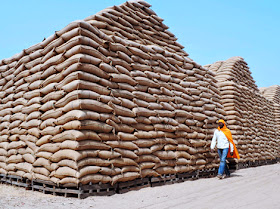India needs to become more nimble in allowing wheat and rice exports from overstocked government silos if it wants to cut waste and get the best price for its grains, a panel appointed by Prime Minister Narendra Modi recommended, according to Reuters.
Despite stocks that are often more than double the government's target, India exports only about 10 percent of its wheat and rice output of 195 million tonnes.
The Food Corporation of India (FCI), a government behemoth set up 60 years ago after acute food shortages forced India to import, sits on mounds of rice and wheat thanks to bumper harvests since 2007.
"Because of bureaucracy, we take a long time to agree on exports and market dynamics change by then, thwarting our efforts to make the best out of attractive prices abroad," Shanta Kumar, chief of the panel, said after unveiling the report on Thursday.
Currently the government takes a call on exports and local sales after a lengthy consultation process.
The panel would like the FCI to abolish regional offices, focus on key states for procurement, invest in computerisation and bring in technical and managerial expertise from the private sector.
"A nimble-footed FCI will help us earn precious foreign exchange and save a lot of money that is blocked in terms of extra grains stocks that is prone to pest attack and wastage," said Ashok Gulati, a noted economist and a member of the panel.
Modi, who formed the panel in August to suggest an overhaul of India's theft-prone food distribution network, has asked the food ministry to examine the recommendations before acting on the report.
India, the world's biggest rice and wheat producer after China, runs a mammoth $18.64 billion food welfare programme. But nearly half of the ultra-cheap rice and wheat meant for the poor is either wasted or stolen, according to various experts.
The panel also suggested the government scale down its food distribution programme by covering only 40 percent of the population, instead of 67 percent. However, it favoured a higher monthly allocation of 7 kg per person against 5 kg now.
Lowering the number of beneficiaries could save India 330 billion rupees ($5.35 billion) a year in subsidies, said Kumar, a former food minister. But the move could potentially anger millions of voters enjoying cheap grains and would require the approval of India's partisan parliament.
"It's not an easy task to reduce the level of beneficiaries as a host of procedural hurdles will have to be crossed before accepting the latest recommendations," said B.C. Barah, a New Delhi-based agriculture economist.
Read the article HERE.
Despite stocks that are often more than double the government's target, India exports only about 10 percent of its wheat and rice output of 195 million tonnes.
The Food Corporation of India (FCI), a government behemoth set up 60 years ago after acute food shortages forced India to import, sits on mounds of rice and wheat thanks to bumper harvests since 2007.
"Because of bureaucracy, we take a long time to agree on exports and market dynamics change by then, thwarting our efforts to make the best out of attractive prices abroad," Shanta Kumar, chief of the panel, said after unveiling the report on Thursday.
Currently the government takes a call on exports and local sales after a lengthy consultation process.
The panel would like the FCI to abolish regional offices, focus on key states for procurement, invest in computerisation and bring in technical and managerial expertise from the private sector.
"A nimble-footed FCI will help us earn precious foreign exchange and save a lot of money that is blocked in terms of extra grains stocks that is prone to pest attack and wastage," said Ashok Gulati, a noted economist and a member of the panel.
Modi, who formed the panel in August to suggest an overhaul of India's theft-prone food distribution network, has asked the food ministry to examine the recommendations before acting on the report.
India, the world's biggest rice and wheat producer after China, runs a mammoth $18.64 billion food welfare programme. But nearly half of the ultra-cheap rice and wheat meant for the poor is either wasted or stolen, according to various experts.
The panel also suggested the government scale down its food distribution programme by covering only 40 percent of the population, instead of 67 percent. However, it favoured a higher monthly allocation of 7 kg per person against 5 kg now.
Lowering the number of beneficiaries could save India 330 billion rupees ($5.35 billion) a year in subsidies, said Kumar, a former food minister. But the move could potentially anger millions of voters enjoying cheap grains and would require the approval of India's partisan parliament.
"It's not an easy task to reduce the level of beneficiaries as a host of procedural hurdles will have to be crossed before accepting the latest recommendations," said B.C. Barah, a New Delhi-based agriculture economist.
Read the article HERE.
The Global Miller
This blog is maintained by The Global Miller staff and is supported by the magazine GFMT
which is published by Perendale Publishers Limited.
For additional daily news from milling around the world: global-milling.com


No comments:
Post a Comment